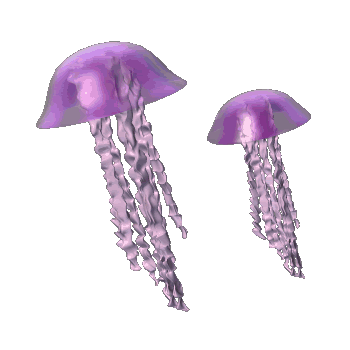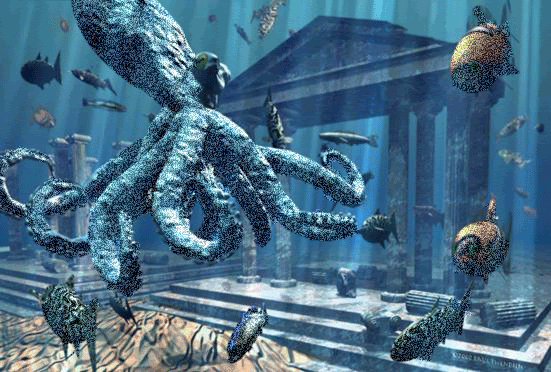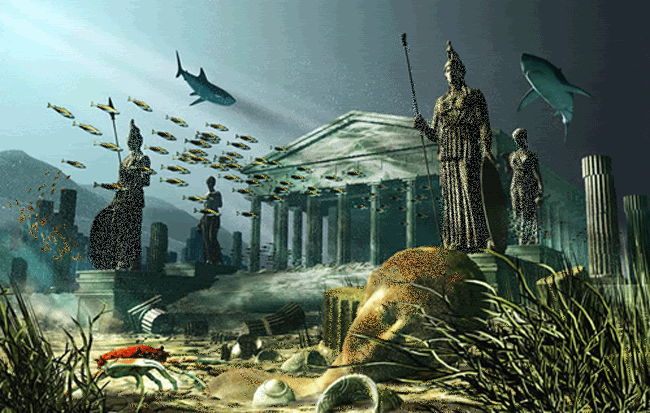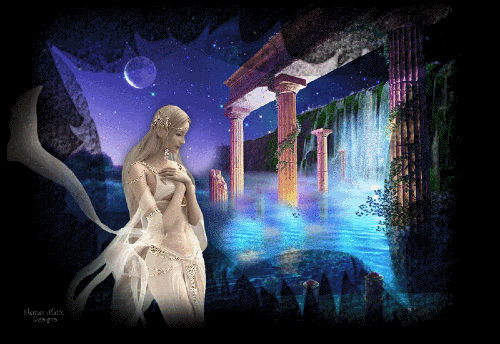|

"All Civilizations begin with order, grow with liberty, and die with chaos"
~Will Durant~


The greek philosopher, Plato, brought to the world, the story of the lost continent of Atlantis. His story began to unfold for him around 355 B.C. He wrote about this land called Atlantis in two of his dialogues, Timaeus and Critias, around 370 B.C. Plato stated that the continent lay in the Atlantic Ocean near the Straits of Gibraltar until its destruction 10,000 years previous.
According to Plato, this story finds provenance in Egypt, where it was told to the Athenian thinker Solon by a priest in the ancient city of Sais. Atlantis was a nation 'larger than Libya and Asia together', and had existed a full 9,000 years before Solon's birth, or around 9,600 BC. The story crosses over into Timaeus, the more historically-minded side of the story in which Plato reiterates the state's efficacy as having 'genuine history', and being within the 'realm of fact'. This Atlantis is portrayed as the antithesis of the 'perfect' Athenian society, and attempts to conquer Athens as it spreads mercilessly eastwards. Plato describes a mighty battle between the two superpowers which the Atlanteans lose, of course. Upon their devastating defeat, the island is beset by a deluge of natural disasters:
"Afterwards there occurred violent earthquakes and floods; and in a single day and night of misfortune all your warlike men in a body sank into the earth, and the island of Atlantis in like manner disappeared in the depths of the sea."

Plato is often cited as the primary source for the reality of a place on earth called Atlantis. Here is what the Egyptian priest allegedly told Solon:
Many great and wonderful deeds are recorded of your state in our histories. But one of them exceeds all the rest in greatness and valour. For these histories tell of a mighty power which unprovoked made an expedition against the whole of Europe and Asia, and to which your city put an end. This power came forth out of the Atlantic Ocean, for in those days the Atlantic was navigable; and there was an island situated in front of the straits which are by you called the Pillars of Heracles; the island was larger than Libya and Asia put together, and was the way to other islands, and from these you might pass to the whole of the opposite continent which surrounded the true ocean; for this sea which is within the Straits of Heracles is only a harbour, having a narrow entrance, but that other is a real sea, and the surrounding land may be most truly called a boundless continent.
Now in this island of Atlantis there was a great and wonderful empire which had rule over the whole island and several others, and over parts of the continent, and, furthermore, the men of Atlantis had subjected the parts of Libya within the columns of Heracles as far as Egypt, and of Europe as far as Tyrrhenia. This vast power, gathered into one, endeavoured to subdue at a blow our country and yours and the whole of the region within the straits; and then, Solon, your country shone forth, in the excellence of her virtue and strength, among all mankind. She was pre-eminent in courage and military skill, and was the leader of the Hellenes. And when the rest fell off from her, being compelled to stand alone, after having undergone the very extremity of danger, she defeated and triumphed over the invaders, and preserved from slavery those who were not yet subjugated, and generously liberated all the rest of us who dwell within the pillars.

It is important to bare in mind that, while many were partial to Plato's storytelling, a large portion of the populous viewed Atlantis with about as much incredulity as today.
Plato's account of the capital of Atlantis still captures the imagination of modern writers and artists, and seems an incredibly modern layout at a time when Hippodamus' ground-breaking grid-based city plans had just arrived. The city itself comprised a number of concentric rings of land and canals, in the centre of which was a shrine to Poseidon and his mortal wife Cleito, surrounded by a golden wall through which entry was forbidden.

Receptions
So if Plato couldn't make his mind up on Atlantis, how has history sought the elusive state? Not very conclusively, it seems. A student of Plato's student Xenocrates, Crantor, was said to have taken Plato's word as truth, but his work was largely lost. It took until the 5th century AD for the Christian philosopher Proclus to comment on Crantor's work. Though the translation of Proclus' literature is hotly debated, most avenues seem to suggest he travelled to Sais, where he observed hieroglyphs confirming Plato's story.
The fact that Plato gets his story from Egypt coincides suspiciously with the Egyptian tale of Keftiu, an island supposedly placed to the west of Egypt. However this island isn't necessarily west of the Mediterranean; thus many believe it to have been the lands of the ancient Minoan civilization, namely Thera and Crete. It seems entirely possible Plato could have misunderstood the Egyptian story, as the Minoans, lasting from around 3,000 – 1,400 BC, would have come into contact with Egyptians, and were indeed an advanced race with language, shipping, trade and commerce. It does seem a compelling argument, and somewhat humorous as it implies Plato may have been standing on the very island he deemed to be lost forever when scribing his account of Atlantis. Supposedly the story's provenance will remain a mystery throughout time. But the sheer romance of the tale, and the fact we still know so little of our own oceans, makes Atlantis a myth revisited by society on a daily basis. Plato's island may never have existed, but it will surely never die.

Nearly all of the ‘lost civilisation’ theories have become associated with the legend of Plato’s ‘Atlantis’, thus the concept and its study have been largely ignored by the serious academic community. Yet ironically it is probably the legend of Atlantis itself, however fanciful, that has provided the foundation for the belief in the existence in a pre-historic civilisation to account for the out-of-place knowledge and artefacts.
Despite Plato's pupil, Aristotle’s belief that the story was fantasy, invented to moralise on the nature and consequences of human ambition, Plato was adamant that the former existence of Atlantis was a matter of historical fact. Whatever the truth, the legend certainly was considered factual for many centuries with even mediaeval sea-charts showing unknown ‘Atlantis’ islands.

Yet if there was a ‘lost civilisation’ (regardless of its connection with or not to the Atlantis legend) it would have had to have had a home, and any identified location would have to provide supporting evidence that a civilisation actually did live there, for, as Egyptologist Mark Lehner rightly points out, without evidence of remains, it would be safer to conclude that that there was no former civilisation, and the purported clues to its existence would have to be explained in some other way.
Many locations for the lost civilisation have been suggested with many of them centring on the Mediterranean area. A Dr. James Mavor set out one theory in his 1969 book, believing that the lost peoples were a Minoan civilisation. This followed earlier claims first set out in the 1930s by Greek scientists Dr Angelos Galanopoulos and Professor Spyridon Marinatos.
Many people believe the story is reminiscent of what Athens did against the Persians in the early 5th century BCE, but the battle with Atlantis allegedly took place in the 8th or 9th millennium BCE. It would not take much of a historical scholar to know that Athens in 9,000 BCE was either uninhabited or was occupied by very primitive people. This fact would not have concerned Plato's readers because they would have understood that he was not giving them an historical account of a real city. To assume, as many believers in Atlantis do, that there is a parallel between Homer's Iliad and Odyssey and Plato's Critias and Timaeus is simply absurd. And those who think that just as Schliemann found Troy so too will we someday crack Plato's code and find Atlantis are drawing an analogy where they should be drawing the curtains. Plato's purpose was not to pass on stories, but to create stories to teach moral lessons.

Different seekers have located the mythical place in the mid-Atlantic, Cuba, the Andes, and dozens of other places. Some have equated ancient Thera with Atlantis. Thera is a volcanic Greek island in the Aegean Sea that was devastated by a volcanic eruption in 1625 BCE. Until then it had been associated with the Minoan civilization on Crete.
To many, however, Atlantis is not just a lost continent. It is a lost world. The Atlanteans were extraterrestrials who destroyed themselves with nuclear bombs or some other extraordinarily powerful device. Atlantis was a place of advanced civilization and technology. Lewis Spence, a Scottish mythologist who used "inspiration" instead of scientific methods, attributes Cro-Magnon cave paintings in Europe to displaced Atlanteans (Feder, 130). Helena Blavatsky and the theosophists of the late 19th century invented the notion that the Atlanteans had invented airplanes and explosives and grew extraterrestrial wheat. The theosophists also invented Mu, a lost continent in the Pacific Ocean. Psychic healer Edgar Cayce claimed to have had psychic knowledge of Atlantean texts which assisted him in his prophecies and cures. J.Z. Knight claims that Ramtha, the spirit she channels, is from Atlantis.
The serious investigator of the myth of Atlantis must read Ignatius Donnelly's Atlantis: the Antediluvian World (1882). In the spirit of von Däniken, Velikovsky and Sitchin, Donnelly assumes that Plato's myth is true history. Much of the popularity of the myth of Atlantis, however, must go to popular writers such J.V. Luce (The End of Atlantis, 1970) and Charles Berlitz, the man who popularized the Bermuda Triangle and the discovery of Noah's Ark. His Doomsday, 1999 A.D. (1981) comes complete with maps of Atlantis and drawings by J. Manson Valentine. Graham Hancock is doing much to keep alive this tradition of "alternative" and "speculative" history and archaeology which seeks a single source for ancient civilizations.

Atlantis and the aliens
These "alternative" archaeologists have credited the Atlanteans with teaching the Egyptians and the Mesoamericans how to build pyramids and how to write, etc., arguing similarly to von Däniken that ancient civilizations burst on the scene in a variety of different places on earth and have a common source. Atlanteans or aliens, either way the case can be made for a common source for ancient civilizations only if one selectively ignores the gradual and lengthy development of those societies. One must also ignore that the writing of the Egyptians is no clue to the writing of the Mayans, or vice-versa, and that the purpose of their pyramids was quite different. The Mesoamericans rarely buried anyone in their pyramids; they were primarily for religious rituals and sacrifices. The Egyptians used pyramids exclusively for tombs or monuments over tombs. Why would the aliens or Atlanteans not teach the same writing techniques to the two cultures? And why teach step building in Mesoamerica, a technique not favored by the Egyptians? If you ignore the failures of the early pyramid builders and ignore their obvious development over time, including the development of underground tombs with several chambers, then you might be able to persuade uncritical minds that Giza couldn't have occurred without alien intervention.

Finally, one should wonder, I suppose, if the Atlanteans were such technological geniuses who shared their wisdom with the world, why did Plato depict them as arrogant warmongers?
Unfortunately for the New Age Atlanteans, there is no credible and convincing archaeological or geological evidence for either Atlantis or Mu. But regardless of proof, this is one mystery that will surely dazzle the imagination for generations to come.
sour ces: ces:
http://www.skepdic.com/atlantis.html
http://www.violations.org.uk/atlantis_theories.html
Background and graphics by:

Next Back Home
|